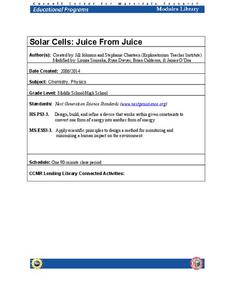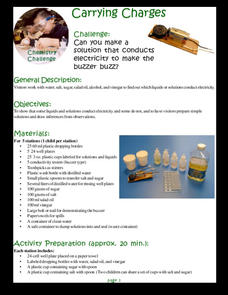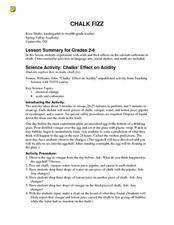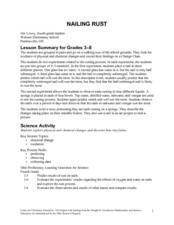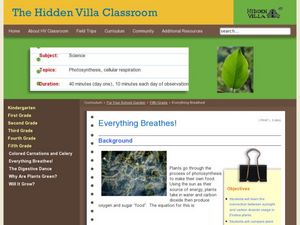Curated OER
Investigating What Makes Fruit Go Brown
Is there anything that can be done to slow the browning of fruit once it has been cut? High schoolers determine the answer through five different investigations involving apples, potatoes, and chemical reactions. After each experiment,...
Curated OER
Fuel Cell Experimentation
With rising oil prices and increasing concerns over global warming, the pressure is on for engineers to develop alternative sources of energy. Among the new technologies being developed are hydrogen fuel cells, which young scientists...
NOAA
Off Base
How does carbon dioxide affect the world's oceans? The final installment in a series of six lessons has pupils research ocean acidification, then conduct an experiment to witness the delicate balance that exists in our seas. Materials...
Cornell University
Making a Battery
Don't be shocked when your class has a blast making their own batteries! Science scholars examine a dry cell battery, then design and construct a wet cell battery. The activity guides them through the parts of a battery, the variables...
Cornell University
Chemical Reactions
Investigate the Law of Conservation of Mass through a lab exploration. Individuals combine materials to initiate chemical reactions. They monitor for signs of reactions and measure the masses before and after the reactions for comparison.
Cornell University
Solar Cells: Juice From Juice
Unleash the power of ... blackberries! Science superstars create solar cells using the juice of berries or leaves of a citrus tree in an engaging lab. In addition to offering a plethora of resources, the teacher's guide gives background...
Beyond Benign
SLS Toxicology Test
Ingredients in your shampoo are toxic enough to kill plants. The 16th installment of the series of 24 tests the toxicity level of various concentrations of SLS, a chemical found in nearly all shampoo. Learners prepare percent solutions...
Sciencenter
Carrying Charges
What's all the buzz about electricity? Scholars take part in a scientific activity to test the conductivity of liquids and solutions. They first see if water, salad oil, alcohol, and vinegar cause a buzzer to buzz when electrodes are...
Curated OER
Acid Rain
Simulated acid rain, a dilute sulfuric acid solution, needs to be prepared for this demonstration. After a condensed lecture on acid rain, you will apply the solution to a sample of granite and a sample of limestone. Your young...
Curated OER
What is Water?
Students examine water's properties. They participate in hands-on activities to show the properties of water.
Curated OER
"Shooting An Elephant": George Orwell's Essay on His Life in Burma
High school readers examine George Orwell's essay "Shooting an Elephant" for examples of symbolism, metaphor, connotation, and irony. They analyze how these literary tools convey the writer's main point and contribute to the persuasive...
Curated OER
Chalk Fizz
Little chemists observe the effects of acid on calcium carbonate as an example of chemical change. As a demonstration you will place a raw egg in vinegar overnight, and as a lab activity, learners drip vinegar onto a piece of chalk....
Curated OER
Nailing Rust
When your upper elementary or middle school class is learning about chemical changes, these activities help demonstrate the concepts. In Part A, they submerge and place a nail partially underwater, then after a week they make...
Curated OER
Digital Video Lesson Plan: Brine Shrimp
Students participate in classroom experiment to gain better understanding of type of environment brine shrimp can best survive. Students then explore effects of common saltwater pollutants on survival of animals in sea.
Curated OER
Black Death Biology
Students in pairs explore the transmission of the Plague, through experimentation. Cooperative groups use the scientific method to solve the fictional problem of a bacteria spreading in the Amazon. Groups also create a vector to visually...
Curated OER
Kind Kids
Students decide what it means to be kind to others and draw pictures of ways they have been kind. They place kind kids pictures in a book for the classroom library. Students receive certificates for post lesson kind acts.
Curated OER
Pride and Prejudice
Help your class recognize classic literature with universal themes. They will demonstrate their familiarity with Pride and Prejudice by updating a selected scene from it to the 21st century. Tip: Bring in a modern movie clip that shows...
Curated OER
Eutrophication
Students observe the effects of eutrophication and determine why it is harmful to aquatic ecosystems. They create mason jar ecosystems to observe the growth of algae in pond water. In addition, they observe the effect of introducing...
Curated OER
Strong Acids and Bases
A straight-forward exercise awaits your chemistry charges. Two pages provide plenty of room for them to calculate the pH of five solutions, determine the number of hydrogen and hydroxide ions, and solve problems dealing with solutions....
Curated OER
Everything Breathes!
Fifth graders test plants in the dark and in the light to see which grows better and produces more carbon dioxide. In this plants lesson plan, 5th graders also create ways for plants to go through photosynthesis that they can observe.
Science Friday
Termite Symbiosis
What happens to the wood a termite eats? Pupils learn about the three types of symbiosis with pictures of symbiotic pairs. Afterward, they determine whether there is a symbiotic relationship with a termite by dissecting termites and...
Curated OER
Hazards of Defrosted Food
Peas spoilage hot, peas spoilage cold: examine the bacterial growth on newly defrosted peas versus peas that have been defrosted for 24 hours. Using the session one questions in the "Microbes and Food Spoilage" PDF, learners will make...
Dream of a Nation
Read, Watch, Write for Pathos, Logos and Ethos
Encourage your young citizens to make a difference. Using Tyson Miller's Dream of a Nation: Inspiring Ideas for a Better America as a starting point, class members watch documentaries, investigate issues, and then write letters to...
Salt River Project
How Do We Clean Polluted Water?
How do we clean up oil spills and other pollutants in the water? Explore water treatment strategies with a set of environmental science experiments. Groups remove oil from water, work with wastewater treatment, and perform a water...
Other popular searches
- Fractional Distillation
- Water Distillation
- Distillation Lab
- Simple Distillation
- Distillation Crude Oil
- Fraction Distillation
- Salt Water Distillation
- Distillation Experiments
- Water Cycle and Distillation
- Fractional Distillation Labs
- Science Distillation
- Petroleum Distillation







